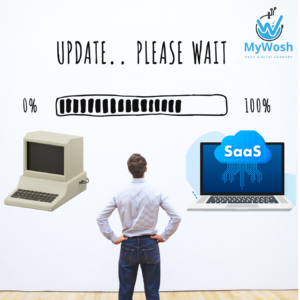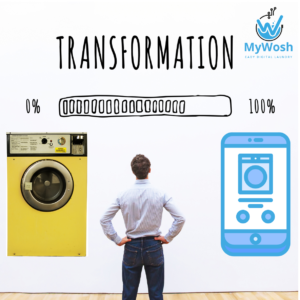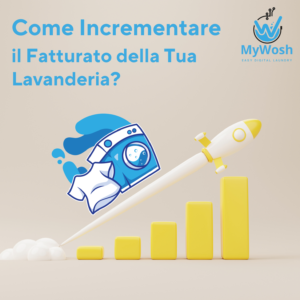In the bustling world of laundry and dry cleaning, where the stages of change rotate as fast as washing machines, keeping up is not merely an option, but an imperious necessity. The laundry industry, renowned for its innate ability to adapt to changing consumer needs, technological advances and societal transformations, is currently undergoing a dynamic evolution in 2024. With consumers increasingly comfort-oriented, demanding sustainability and eager for seamless digital experiences, laundry services are being called upon to not only respond to, but actively embrace these transformative trends.
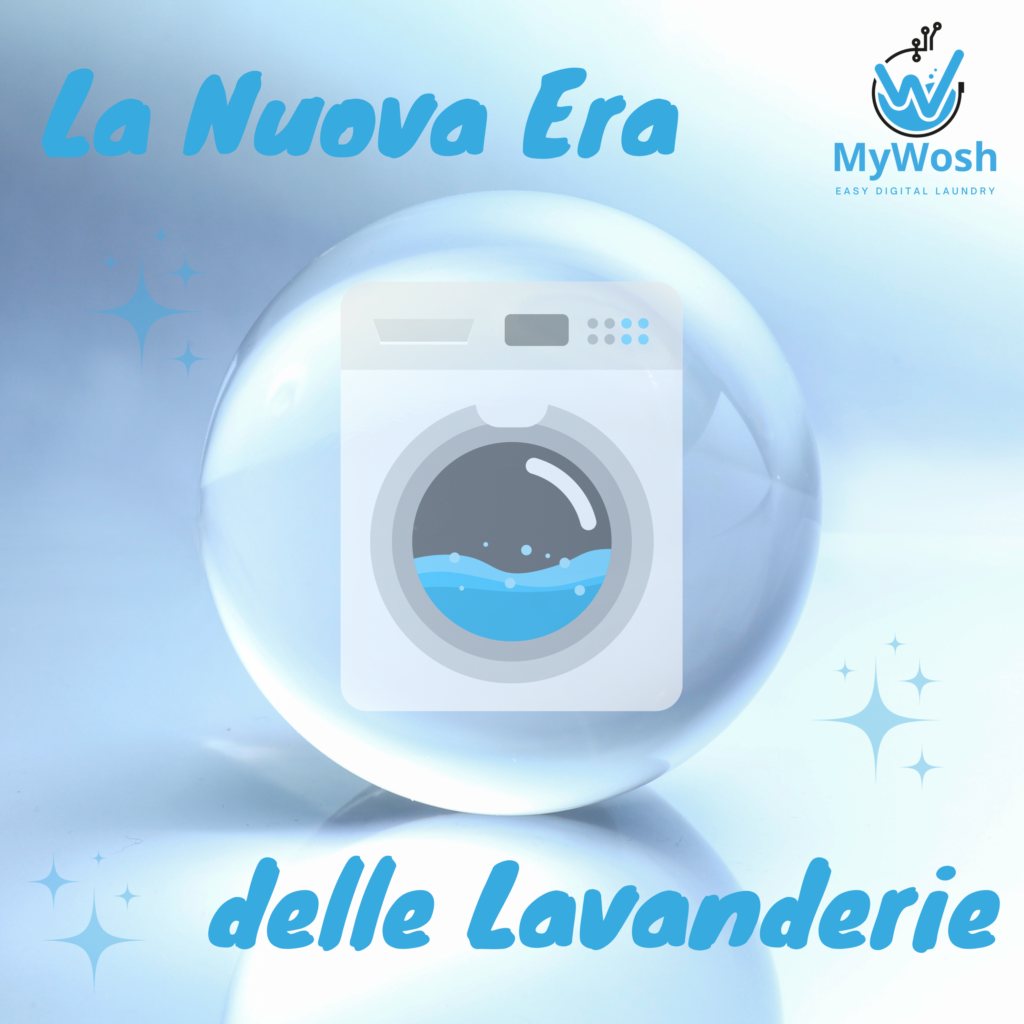
Join us for this exploration of the future of laundry, where we will delve into the importance of staying one step ahead in an ever-changing market. We will offer an exclusive look at the transformative trends that will define laundry services in the year 2024, opening the door to a panorama of innovations and adaptations that will take centre stage in the industry's next chapter.
1. Growing Demand for Convenience (Time Saving)
Convenience as a Market Driver
In an era where time is of the essence, the laundry industry is at the forefront of meeting the growing demand for convenience. Convenience is not just a coveted attribute; it has become a primary driver shaping the market landscape. We delve into the key aspects fuelling this demand and understand how the industry is evolving to meet the expectations of today's fast-paced lifestyles.

Overview of Growing Demand
The demand for convenience in laundry services has seen a significant increase recently. Consumers, accustomed to the immediacy of modern life, are looking for laundry solutions that integrate seamlessly into their daily routines. From busy working professionals to busy families managing a myriad of responsibilities, there is a growing consensus that laundry services should be as efficient and adaptable as the lives they serve.
Laundries and dry cleaners are no longer perceived as mere service providers, but as essential partners in the quest for a more manageable lifestyle. This shift in perception underlines a fundamental change in consumer behaviour, where the value placed on time-saving solutions becomes predominant.
Impact of Frenetic Lifestyles on Consumer Preferences
The impact of modern, hectic lifestyles cannot be underestimated. With individuals caught up in a web of professional and personal commitments, the time available for household chores is reduced. In this scenario, the convenience of outsourcing laundry becomes not just a luxury, but a practical necessity.
The growth of dual-income households combined with the constant search for a work-life balance has intensified the need for time-efficient solutions. Consumers no longer wish to devote precious hours to laundry chores when professional and personal demands are overwhelming. Instead, they seek services that seamlessly align with their schedules, offering flexibility without compromising quality.
The demand for convenience is a testament to the evolving expectations of consumers who view their time as a valuable commodity. In response to this paradigm shift, the laundry industry is embracing innovative approaches, such as the on-demand services and flexible planning to ensure that convenience remains at the heart of its offerings.
As we navigate the evolving landscape of convenience-driven laundry solutions, it becomes clear that the industry's ability to meet these expectations will be critical in shaping its future path. Stay tuned as we further explore the transformative trends shaping the world of laundry services in 2024.
2. Eco-Sustainable Practices
Implementation of Biodegradable Detergents
One of the pillars of sustainable laundry practices lies in the adoption of biodegradable detergents. Traditional laundry detergents often contain harmful chemicals that, when discharged, can have a negative impact on aquatic ecosystems. Biodegradable detergents, on the other hand, degrade naturally without causing harm, offering a greener alternative that resonates with environmentally conscious consumers.

The use of biodegradable detergents not only reduces environmental impact, but also aligns with the values of consumers who are increasingly aware of the consequences of their choices on the planet. This section will explore how the integration of biodegradable detergents is becoming standard practice for laundry services that seek to meet the needs of environmentally conscious customers.
Adoption of Water-Saving Technologies and Efficient Equipment
Beyond detergents, sustainable laundry practices extend to water and energy use. Forward-thinking laundry services are actively adopting water-saving technologies and investing in energy-efficient equipment to minimise their ecological footprint. The significance of these initiatives goes beyond mere environmental compliance; it reflects a commitment to responsible resource management.
Water-saving technologies such as high-efficiency machines and optimised washing processes not only reduce water consumption but also contribute to lower energy requirements. This dual impact addresses two critical aspects of environmental sustainability. By exploring how these practices are implemented, this section aims to shed light on the comprehensive approach that environmentally conscious laundry services are taking to reduce their environmental impact.
As we traverse the landscape of sustainability initiatives in the laundry industry, it becomes evident that eco-consumerism is a driving force behind the adoption of environmentally friendly practices.
3. Digital Transformation
Shaping the Industrial Landscape
In an environment of continuous innovation, the laundry and dry cleaning industry is undergoing a significant transition towards digital solutions to improve efficiency. This evolution is not simply a trend, but a fundamental transformation that promises to redefine the way laundries operate. At the forefront of this progressive movement are cloud-based laundry management systems such as MyWosh, inaugurando una nuova era di operazioni snelle e tecnologicamente avanzate.

Introduction to Cloud-Based Laundry Management Systems
Cloud-based laundry management systems represent a revolutionary step forward for the industry. These systems harness the power of the cloud to centralise and optimise various aspects of laundry operations. From order processing to inventory management, the cloud facilitates real-time collaboration and data accessibility, paving the way for a more agile and responsive laundry ecosystem.
In this chapter, we want to introduce MyWosh as an outstanding example of how cloud-based laundry management systems are transforming the operational landscape. MyWosh is not just a system, but a strategic partner that takes digital transformation to the next level for laundries. MyWosh stands out for its ability to integrate the best of cloud-based technology into the daily operations of laundries.
From the automation of order processing to automatic garment tracking, from fast and easy bookkeeping to the elimination of human error and wasted time, MyWosh is designed to optimise every aspect of a laundry's operations, ensuring efficiency and accuracy. The integration of MyWosh represents a turning point for laundries, offering unprecedented operational efficiency and a smooth transition to a digital future.
4. Pick-up and Delivery Services
Impact of Urban Lifestyle
The hustle and bustle of urban life has significantly shaped consumer preferences in the laundry sector, leading to an increase in the popularity of pick-up and delivery services. In the fast-paced urban environment, where time is a precious resource, consumers are increasingly turning to services that align with their tight schedules. The impact of the urban lifestyle on laundry habits has become a driving force behind the demand for more convenient and affordable solutions.

Responding to the Need for Convenience in Crowded Urban Areas
Busy professionals, families grappling with multiple responsibilities and individuals navigating the complexities of urban life share a common demand: the need for convenience.
Pick-up and delivery services integrate seamlessly into the rhythm of urban life, offering a lifeline to those who find it difficult to find time for everyday tasks such as laundry. This change in consumer behaviour underlines the readiness of the industry to respond to the changing needs of urban dwellers, emphasising the importance of services that can adapt to the demands of a hectic lifestyle.
Door to Door Services
The evolution of pick-up and delivery services goes beyond mere convenience; it extends directly to the consumer's door. Modern laundries are expanding their service offerings to include complete door-to-door solutions, eliminating the need for customers to physically go to the point of sale. This strategic expansion not only satisfies the convenience-oriented urban customer base, but also aligns with the broader trend of minimising in-person interactions, something that has gained importance, especially in relation to public health concerns.
Expansion of Service Offerings to Include Door-to-Door Solutions
Laundries recognise the primary importance of meeting customers where they are: right in front of their doors. Door-to-door services not only simplify the customer experience, but also contribute to the overall efficiency of the laundry process. By collecting and delivering directly from the customer's preferred location, these services improve the smoothness of the entire laundry process.
Reducing the Need for Customers to Go to Physical Points
The expansion of door-to-door services is a proactive response to the needs of urban customers seeking to reduce their busy schedules and optimise their daily routines. By eliminating the need for customers to visit physical outlets, laundries are not only offering a service, but proposing a lifestyle solution tailored to the unique challenges of urban life. This customer-centred approach positions pick-up and delivery services as a key element of the modern laundry experience.
As we delve into transformative trends in the laundry industry, the chapter on pick-up and delivery services reveals the symbiotic relationship between urban life and the demand for unparalleled convenience. Stay tuned as we further explore various aspects of the evolving laundry landscape and how businesses are innovating to meet the dynamic needs of their urban customers in 2024.
On-Demand Laundry with MyWosh
La nostra avanzata piattaforma di ritiro e consegna integrata rappresenta il cuore pulsante di un’esperienza di lavanderia on-demand senza intoppi. MyWosh strives to offer a complete solution that goes beyond simple order and inventory management, putting customer experience and convenience for laundry companies and their valued customers at the centre.
- Simple planning for pick-ups and deliveries: Our platform is designed to make scheduling pick-ups and deliveries a breeze. Customers can easily schedule services according to their preferred schedules, ensuring flexibility and adaptability to their individual needs. This key element greatly enhances MyWosh's service offering, turning it into a solution that meets the expectations of increasingly convenience-oriented consumers.
- Enhancement of the MyWosh Service Offer: The integration of the pick-up and delivery system is not just an additional feature; it represents a significant enhancement of the MyWosh service offering. This upgrade not only simplifies the process for laundry companies, but also results in a smoother and more convenient user experience for end customers. MyWosh aims to go beyond expectations, positioning itself as the ideal partner for laundries seeking to offer state-of-the-art services.
- Priority to Convenience for Laundry Companies and their Customers: Our pick-up and delivery system is designed with the objective of putting convenience first, both for laundries and their valued customers. We offer an uncomplicated solution, allowing laundries to optimise their operations and consumers to enjoy a flexible and stress-free service.
MyWosh non è semplicemente una piattaforma; è un alleato strategico che mira a ridefinire il modo in cui le lavanderie gestiscono le loro attività e come i consumatori vivono l’esperienza della lavanderia. Unisciti a noi nell’esplorare il futuro della lavanderia, dove la comodità è alla base di ogni interazione, e MyWosh è il veicolo che rende possibile questa trasformazione.
5. Mobile App & Online Booking
Standardisation of the Customer Experience
The evolution towards Mobile Apps and Online Booking Platforms is significantly redefining the customer experience in the laundry industry. This chapter will explore the growing importance of these digital tools in offering a fundamental standardisation of the customer experience, meeting expectations of convenience and accessibility.

The Change to Mobile Apps and Online Reservations
The laundry landscape is witnessing a radical transformation with the widespread adoption of Mobile Apps and Online Booking Platforms. This shift is a direct response to the growing expectations of modern consumers, who demand instant access and tailored services. The convenience of booking a laundry service or monitoring the status of an order via mobile devices has become a necessity for many people in an increasingly connected world.
Customer Expectations in Terms of Convenience and Accessibility
Users today expect a laundry experience that reflects the ease and convenience typical of the digital age. Mobile Apps and Online Booking Platforms are the industry's answer to this growing demand for tailor-made services. The ability to book and monitor services anytime, anywhere becomes a key factor in retaining and attracting a loyal customer base.
Digital Involvement
Leveraging Digital Platforms for Effective Customer Engagement
Digital engagement has become an essential component in maintaining a meaningful connection with customers. Laundries are increasingly leveraging digital platforms to actively engage their customers. Mobile apps are no longer simple booking tools; they have become vehicles for deeper, more interactive engagement.
The Role of Apps in Order Tracking, Payment and User Experience Enrichment
Mobile Apps play a crucial role in order tracking, payment processing and enriching the overall user experience. Customers can easily monitor the status of their orders in real time, make secure payments and access exclusive promotions through these platforms. The integration of advanced functionality not only simplifies the process for consumers, but also helps build a stronger and more interactive relationship between laundries and their customers.
As we plunge into the digital age of laundry, the strategic use of mobile apps and online booking emerges as a key element in meeting the expectations of modern consumers. In the next segment, we will explore in more depth the facets of this digital revolution and how laundries are adopting innovative solutions to stay ahead of the dynamic demands of 2024. Stay with us as we explore the future of digital laundry and how technology is redefining the way consumers interact with laundry services.
MyWosh - The Mobile App That Transforms the Customer Experience and Optimises Laundry Operations".
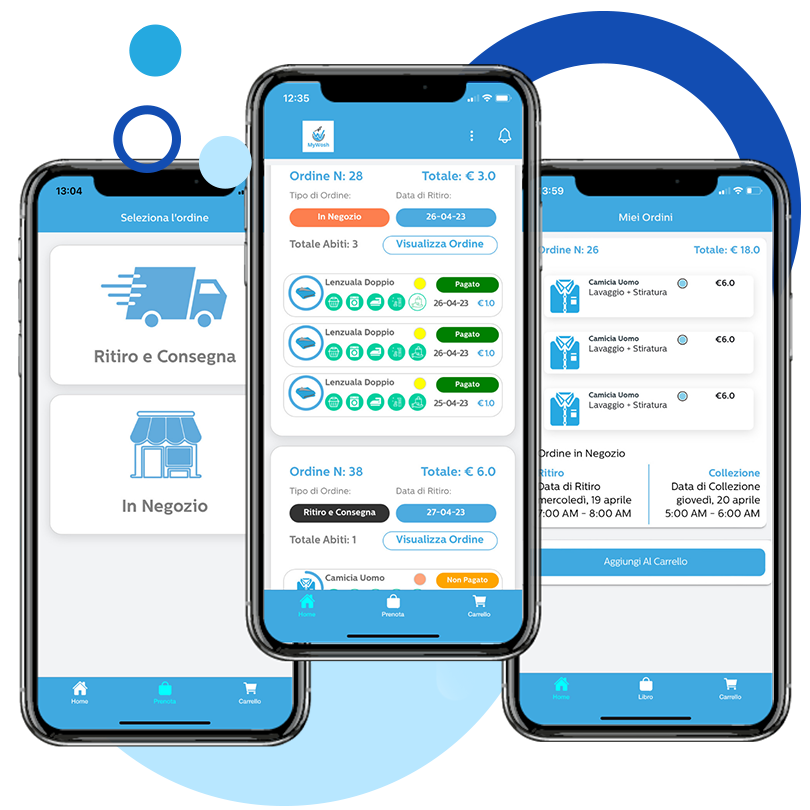
The MyWosh mobile app as a key element of our solution, designed to improve the customer experience and foster business growth for laundries. With the MyWosh app, laundries can offer their customers a faster, more convenient, personalised and secure service; leading to a significant increase in customer satisfaction and loyalty.
Our app allows laundries to optimise the efficiency of their operations, simplify the booking process, enable real-time tracking of garments and provide secure payment options. The goal is to create a hassle-free experience for customers, while increasing the profitability of laundries through increased satisfaction and loyal customers.
Key Benefits
- Effortless Online Booking: Our app simplifies the booking process for customers, allowing them to schedule pick-ups, deliveries and specify their preferences with ease. By eliminating the need for manual bookings and phone calls, we streamline operations and improve efficiency, ensuring a smooth and hassle-free experience for both customers and laundries.
- Real-Time Garment Tracking: Transparency and visibility are crucial in the laundry industry. Through the MyWosh app, customers can monitor the progress of their garments in real time. From acceptance to production and delivery, customers can stay informed every step of the way, promoting confidence and peace of mind.
- Secure Payments and Convenience: We give top priority to the security of financial transactions. Our mobile app provides secure payment options, allowing customers to conveniently settle their accounts within the app. By offering a seamless and secure payment experience, we foster trust and reliability, reducing friction and improving customer satisfaction.
- Convenience at Customer Fingertips: By offering our mobile app, you provide your customers with a convenient, fast and secure service. Our app allows customers to manage their laundry needs anytime, anywhere, creating a truly customer-centric experience.
The MyWosh platform is designed to improve the overall customer experience and optimise the operational efficiency of laundries. Through an intuitive and accessible user interface, accompanied by a convenient, fast and secure service, MyWosh delivers value to both laundries and their customers. Our platform not only increases customer satisfaction, but also gives laundries the tools they need to remain competitive in the digital age.
6. Quality and Specialisation
In the dynamic landscape of the laundry industry, where competition is intense, companies are increasingly recognising the crucial role that quality plays in standing out from the crowd. This chapter explores the increased emphasis on quality as a key differentiator and how laundry services strategically employ specialisation to carve out a space in the market.

Growing Emphasis on Quality
Quality has become more than just a feature; it is a strategic imperative. Laundries recognise that in the eyes of discerning consumers, quality of service is non-negotiable. Customers expect not only clean, well-ironed garments, but an overall experience that reflects excellence at every touch point.
Laundries are investing in state-of-the-art equipment, employing experienced professionals and implementing rigorous quality controls to ensure that each garment receives meticulous attention. The focus on quality goes beyond the visible result; it involves the entire customer journey, from the ease of scheduling services to the reliability of delivery.
Quality is a multifaceted concept in the laundry industry. It includes the careful selection of detergents, the calibration of washing and drying processes, and the skilful handling of different types of fabric. By prioritising quality, laundry services not only meet, but exceed customer expectations, creating a loyal customer base in the process.
Specialised Services Delicate Fabric Care and Ecological Cleaning
In a landscape where one-size-fits-all approaches are becoming obsolete, laundries are embracing specialisation as a means to meet diverse customer needs. Two areas of specialisation that are gaining acceptance are the care of delicate fabrics and environmentally friendly cleaning methods.
Care of Delicate Fabrics: As customers' interest in their wardrobes increases, the demand for specialised care for delicate fabrics is growing. Companies are employing trained professionals who understand the nuances of handling silk, lace and other delicate fabrics. From precise temperature control to gentle detergents, the process is adapted to ensure that delicate fabrics receive the care they deserve.
Ecological Cleaning: Sustainability is not just a trend; it is a responsibility. Laundry services are increasingly adopting environmentally friendly cleaning methods to align with the values of environmentally conscious consumers. This includes the use of biodegradable detergents, energy-efficient machines and water-saving technologies. By offering environmentally friendly options, laundries are not only meeting customers' expectations, but also contributing to a greener and more sustainable future.
The combination of quality and specialisation is proving to be a winning formula for laundry services seeking to distinguish themselves in a competitive market. With increasingly demanding customers, companies that prioritise these aspects not only meet current expectations, but are well positioned to shape the future of the laundry industry.
7. Health and Safety Measures
Post-COVID Priority
The COVID-19 pandemic has brought about a paradoxical shift in the laundry industry, with health and safety emerging as top priorities for both businesses and consumers. This chapter explores the impact of the pandemic on health and safety measures within the industry and analyses how laundries are adapting to the new normal.

The impact of the COVID-19 Pandemic
The COVID-19 pandemic underlined the critical importance of maintaining a hygienic and safe environment in all sectors, including laundry services. Consumers have become increasingly aware of health and safety considerations, prompting a reassessment of industry practices. The laundry industry, being an essential service, has responded promptly to address these concerns, ensuring that customer welfare is at the core of their operational strategies.
Implementation of Strict Hygiene Practices
Laundries have intensified their commitment to hygiene, implementing strict practices in all their operations. This includes the sanitisation of facilities, equipment and transport vehicles. Regular disinfection schedules are now standard, with special attention paid to high contact surfaces to minimise the risk of viral transmission. In addition, laundries provide staff with personal protective equipment (PPE) to ensure their safety when handling garments and interacting with customers.
The handling of bedding and clothing has become a meticulous process, with industry players adopting protocols that minimise the risk of contamination. Advanced cleaning methods, including the use of antibacterial agents and high temperature washing, are now common practice. Incorporating these hygiene measures not only protects customers but also reinforces confidence in the laundry service as a safe and reliable choice.
Contactless Transactions
The growing adoption of contactless transactions is a key response to the need to reduce physical interactions. Laundry services have readily adopted digital payment methods, allowing customers to settle invoices and complete transactions without the need for physical contact. This change not only aligns with health and safety guidelines, but improves the overall customer experience by offering a convenient and secure payment process.
Moreover, contactless transactions extend beyond payments. Laundries are implementing digital interfaces for order location, tracking and communication. Mobile apps and online platforms allow customers to schedule pick-ups, monitor the progress of their orders and receive notifications, all without the need for face-to-face interaction. This not only contributes to a safer experience but also reflects the industry's commitment to adapting to the changing needs of a health-conscious customer base.
In conclusion, the post-COVID era has prompted a fundamental reassessment of health and safety priorities within the laundry industry. The implementation of strict hygiene practices and the adoption of contactless transactions represent a proactive response to the challenges posed by the pandemic. As the industry navigates this new landscape, laundries that prioritise health and safety measures are not only meeting current expectations, but also establishing a foundation of trust and resilience for the future.
8. Market Consolidation
Market consolidation is a significant trend that is redefining the laundry industry, characterised by strategic acquisitions in which larger players acquire smaller companies. This chapter explores the dynamics of market consolidation, analysing the reasons behind strategic acquisitions, the advantages it offers and the implications for the laundry industry.

Strategic Acquisitions: Navigating Industry Dynamics
In the competitive landscape of the laundry industry, strategic acquisitions have emerged as a prominent strategy for growth and market dominance. Larger players within the industry are actively acquiring smaller companies to consolidate their market presence. These acquisitions are not just about expanding the size of the acquiring entity; they are strategic moves aimed at navigating the changing dynamics of the laundry industry.
Acquisitions often bring together complementary strengths, be it specialised services, regional market expertise or advanced technological capabilities. This strategic alignment allows the acquiring entity to improve its overall service offering and operational efficiency. For instance, a larger provider of laundry services might acquire a company specialising in the care of delicate garments, thereby diversifying its service portfolio and serving a broader customer base.
Benefits of Market Consolidation
Market consolidation in the laundry industry offers several advantages that contribute to the growth and sustainability of the companies involved:
- Economies of Scale: One of the main benefits is the realisation of economies of scale. Larger operations often lead to cost efficiencies, whether through bulk purchasing of supplies, rationalised logistics or optimised use of technology. This, in turn, can result in increased profitability and competitiveness.
- Diversification of the Services Portfolio: The acquisition of companies with specialised services enables the diversification of the acquiring entity's service portfolio. This not only broadens the range of services available to customers, but also positions the established company as a complete solution for various laundry needs.
- Enhanced Technological Capabilities: In a rapidly changing technological landscape, acquisitions can bring advanced technological capabilities. The integration of innovative technologies, such as state-of-the-art laundry management systems or efficient machinery, can significantly improve the operational efficiency of the consolidated entity.
- Geographical Expansion: Acquiring companies with a strong presence in specific regions allows for geographical expansion without starting from scratch. This strategic advantage allows the established company to penetrate new markets, benefit from existing customer relationships and adapt its services to local preferences.
- Competitive Advantage: Market consolidation often results in a strengthened competitive position. By combining resources, expertise and customer bases, the consolidated entity is better equipped to meet industry challenges, respond to market trends and outperform competitors.
Implications for the Laundry Sector
The trend of market consolidation is shaping the laundry industry in fundamental ways. Smaller companies, through strategic acquisitions, gain access to the resources and expertise of larger entities, ensuring their sustainability and growth in a competitive market. Larger players, on the other hand, consolidate their market presence, offering a wider range of services and adapting to changing customer expectations.
In conclusion, market consolidation is a strategic response to the dynamic landscape of the laundry industry. As companies seek to strengthen their positions, improve their service offerings and navigate through changes in the industry, strategic acquisitions play a crucial role
9. Subscription Models: Increasing Customer Loyalty
The laundry service landscape is undergoing a revolution with the rise in popularity of subscription models. This chapter will explore in detail the growing trend towards subscription-based laundry services, highlighting the benefits of fixed monthly costs and regular pick-ups for consumers.

The Growing Popularity of Subscription-Based Laundry Services
The rapid adoption of subscription models in laundry services is symptomatic of a fundamental transformation in the way consumers address their laundry needs. The convenience offered by these services has contributed significantly to their growing popularity. Let us take a closer look at the key factors that make these models attractive.
- Fixed Monthly Costs: One of the main features that has fuelled the growth of subscription models is the clarity and predictability of monthly costs. For consumers, knowing exactly how much they will spend each month on laundry services offers financial security beyond mere convenience. By removing the uncertainty associated with variable costs, such as those related to the number of garments or weight, customers feel encouraged to make a long-term commitment to the service.
- Regular Withdrawals and Convenience: Subscription models often include regular garment pick-ups, eliminating the need for customers to schedule individual services each time they need them. This regularity not only simplifies linen management, but also offers extraordinary convenience for those who want a regular service without having to remember to book each time.
- Flexibility and Customisation: Although subscription-based, many services offer flexibility. Customers can often choose between different plans to suit their specific needs, changing the frequency of pick-ups or selecting additional services when necessary. This flexibility is essential to ensure that the service meets customers' individual needs.
Advantages of Subscription Models for Consumers
- Certainty of Costs: With fixed monthly costs, consumers know exactly how much they will spend with no surprises at the end of the month. This financial certainty is particularly appreciated in a world where predictability is key to managing the household budget.
- Comfort without Effort: Regular pick-ups offer effortless convenience. Customers do not have to worry about scheduling individual services or managing the logistics of laundry washing. The service integrates into their routine, offering a hassle-free solution to their laundry needs.
- Saving Time: With regular pick-ups and fixed costs, customers save valuable time. They no longer have to spend time planning and organising laundry, allowing them to concentrate on more meaningful activities in their daily lives.
Advantages of Subscription Models for Laundries
- Customer Loyalty: Subscription models promote customer loyalty. With customers making long-term commitments, laundry service providers benefit from a more stable and consistent customer base.
- Resource Planning: With a constant flow of services, suppliers can better plan their human and material resources. Demand forecasting becomes easier, enabling more efficient management of day-to-day operations.
- Financial Stability: The steady revenue stream from subscription models provides financial stability for service providers. This allows them to invest in operational improvements, new technologies and marketing strategies to further consolidate their position in the market.
In conclusion, subscription models are redefining the landscape of laundry services, offering significant benefits to both consumers and suppliers. While customers enjoy fixed costs, regular pick-ups and flexibility, suppliers benefit from a loyal customer base, better resource planning and a stable revenue stream.
10. Competition and Innovation
The role of innovation in maintaining an advantage, be it through technology or superior customer experiences. The exponential growth of digital technologies has redefined competition in the laundry industry, making it increasingly intense and innovation-driven. This chapter will explore the evolution of competition in the digital environment and the key role of innovation to stand out in this highly competitive scenario.

Increased Competition in the Digital Landscape
With the advent of the digital age, competition in the laundry industry has grown significantly. Online platforms, mobile apps and pick-up and delivery services have broadened the playing field, allowing a wider range of players to participate in the market. Online visibility and accessibility through digital devices have made it essential for laundries to adapt to this new, highly competitive environment.
Customers, accustomed to intuitive and convenient digital experiences, now seek the same level of service in laundry. This has prompted companies to invest in advanced technology solutions and to innovate not only in services, but also in the way they interact with customers.
The Fundamental Role of Innovation in Maintaining an Advantage
- Technological Innovation: In the digital age, the adoption of cutting-edge technologies has become crucial. Laundries are implementing cloud-based management systems, advanced mobile apps and Internet of Things (IoT) solutions to improve operational efficiency, simplify bookings and provide a more transparent service. Automation and integration of technological processes reduce errors, optimise operations and improve customer satisfaction.
- Superior Customer Experience: Innovation is not only about technology, but also about creating superior customer experiences. Laundries are developing engagement strategies that go beyond the business transaction. Implementing loyalty programmes, sending personalised notifications and proactively responding to customer feedback help create a stronger bond between the customer and the laundry service.
- Adapting to Market Trends: Innovation also means being proactive in adapting to market trends. Laundries that understand and embrace emerging demands, such as sustainability or the implementation of health measures, demonstrate flexibility and responsiveness, gaining the trust and preference of consumers.
Challenges and Opportunities in the Digital Age
- Challenges: Increased digital competition can present challenges, especially for traditional laundries. The need to adapt quickly to new technologies can be costly, and a lack of online presence can limit visibility and market access.
- Opportunities: On the other hand, the digital era offers unprecedented opportunities. Laundries can leverage online visibility to reach new customers, offer more personalised services through data analysis and improve operational efficiency through digital solutions.
In conclusion, thriving in the digital age requires a balance between adopting innovative technologies and creating engaging customer experiences. Innovation becomes the catalyst for differentiation in competition, ensuring relevance and sustainable growth in the ever-changing digital landscape.
MyWosh: Il Partner Ideale per la Prosperare nell’Era Digitale
MyWosh positions itself as the ideal partner for laundries eager to stand out in the digital competition, offering a state-of-the-art platform that integrates an intuitive mobile app and advanced technology solutions. Here's how MyWosh helps to elevate laundries' operations and improve the overall customer experience:
- Intuitive Mobile App: Our mobile app is designed for ease of use, allowing customers to make reservations, track orders, make secure payments and access exclusive promotions intuitively. The intuitive user interface offers effortless navigation, enhancing customer satisfaction.
- Advanced Technological Solutions: MyWosh implements advanced technologies, such as cloud-based management systems, to optimise the operational efficiency of laundries. Automated order management, individual garment tracking and other operational functionalities reduce errors, allowing laundries to focus on providing high-quality services.
- High Quality Services: With the advanced features of the MyWosh platform, laundries can streamline their operations, simplify the online booking process, enable real-time tracking of garments and provide secure payment options. This results in a hassle-free experience for customers, helping to increase satisfaction and loyalty.
- Attracting New Customers: MyWosh not only enhances the experience of existing customers, but also helps attract new customers through a strong digital presence and convenient services. Online visibility and simplified booking options make it easier for laundries to reach new users, increasing their appeal in the digital marketplace.
- Consolidamento della Posizione di Mercato: MyWosh non solo migliora l’esperienza cliente, ma contribuisce anche a consolidare la posizione di mercato delle lavanderie nell’ambiente digitale. Offrendo una suite completa di soluzioni digitali, MyWosh aiuta le lavanderie a rimanere competitive, adattandosi ai cambiamenti del mercato e alle aspettative dei consumatori.
- Continuous Exploration of Opportunities: By keeping abreast of industry trends, MyWosh supports laundries in continuously exploring new opportunities. This proactive approach allows laundries to flexibly adapt to emerging market demands, ensuring sustainable growth in 2024 and beyond.
In conclusion, MyWosh not only provides advanced tools and technologies to improve laundry operations, but also acts as a strategic partner in driving success in the digital landscape. Our platform is designed to respond to challenges and capitalise on emerging opportunities, enabling laundries to thrive in the digital age. Stay with us to further explore how MyWosh continues to innovate and support laundries in achieving their business goals.
Conclusion
In conclusion, the laundry industry in 2024 is undergoing a profound transformation, driven by dynamic trends that require businesses to adapt and innovate. We summarise the main trends shaping the industry and highlight the crucial role of adaptation, innovation and cloud platforms such as MyWosh in ensuring the success and competitiveness of laundry services.
Main Trends Shaping the Laundry Industry in 2024:
- Growing Demand for Convenience: Consumers increasingly seek convenient laundry solutions, leading to the rise of on-demand services and mobile app-driven experiences.
- Sustainability Initiatives: Eco-conscious consumerism influences laundry choices, pushing companies to adopt environmentally friendly practices such as biodegradable detergents and energy-efficient technologies.
- Digital Transformation The industry is undergoing a transformation towards digital solutions, with cloud-based platforms such as MyWosh optimising operations, managing orders and improving customer experiences overall.
- Pick-up and Delivery Services: Urban lifestyles are driving the popularity of pick-up and delivery services, offering convenience and meeting the needs of crowded urban areas.
- Mobile Apps and Online Booking: The adoption of mobile apps and online booking platforms is standardising customer experiences, meeting expectations of convenience, accessibility and digital engagement.
- Quality and Specialisation: Quality has become a strategic imperative, with companies emphasising meticulous garment care and ecological cleanliness. Specialisation enables them to meet the different needs of their customers.
- Health and Safety Measures: Post-COVID priorities have redefined the industry's focus on health and safety, leading to the implementation of strict hygiene practices and an increase in non-contact transactions.
- Market Consolidation: Strategic acquisitions are redefining the landscape, with larger players acquiring smaller companies to achieve economies of scale, improve service portfolios and strengthen competitive positions.
- Subscription models: The popularity of subscription-based laundry services is growing, offering customers fixed monthly costs and regular pick-ups, promoting loyalty.
- Competition and Innovation: Increased competition in the digital age requires innovation for businesses to thrive. This includes technological advancements and superior customer experiences.
The Importance of Adaptation and Innovation:
The laundry industry's ability to thrive in this dynamic scenario depends on its ability to adapt and innovate. Companies must be agile in responding to changing consumer expectations, market trends and industry challenges. Embracing innovation, both in terms of technology and customer-centric approaches, is not only a strategic choice, but a fundamental necessity.
Adapting to emerging trends ensures that companies remain relevant and competitive. Whether incorporating sustainable practices, implementing advanced technologies or diversifying service offerings, adaptation is the basis for sustained growth and customer satisfaction.
The Crucial Role of Cloud Platforms such as MyWosh:
In this era of digital transformation, cloud platforms play a crucial role in shaping the success of laundry businesses. MyWosh, with its advanced cloud-based laundry management system and intuitive mobile app, offers a complete solution for laundries eager to thrive in the digital age.
MyWosh optimises operational efficiency, improves the customer experience and provides a competitive advantage. Its features, including real-time order tracking, secure payments and seamless booking, enable laundries to meet and exceed customer expectations. The platform's adaptability and continuous innovation ensure that laundries stay ahead in a rapidly changing industry.
At the conclusion of our exploration of transformational trends in the laundry industry, it is clear that success requires a strategic combination of adaptation, innovation and harnessing cutting-edge technology. MyWosh stands as a testament to the power of cloud platforms in driving business growth, improving customer satisfaction and ensuring a prosperous future for the laundry industry in 2024 and beyond.
